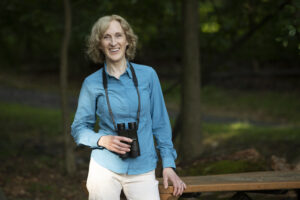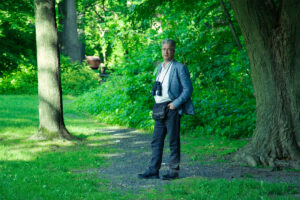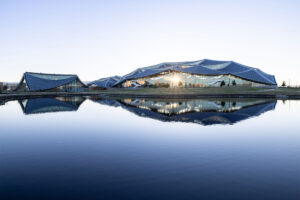
Dr. Elizabeth Gray – CEO of The National Audubon Society
Trained as a scientist and ornithologist, Dr. Gray is the first woman to hold the title of CEO in the organization’s 117-year history.
Global
Leah Sokol September 26, 2023
Obakki is a philanthropic e-commerce brand selling home goods, accessories and apparel that are handcrafted and produced by global artisan partners. Founder Treana Peake is guided by the fundamental belief that giving back can be a part of everyone’s life. Peake launched Obakki in 2005 with a focus on sustainable fashion. Inspired by her time working in international development in Africa, she sought to generate awareness for global causes through her platform. Peake launched The Obakki Foundation two years later combining her passions for social change and design through Obakki’s philanthropic branch. The foundation addresses a multitude of global needs, including educational support, clean water, medical care and livelihood initiatives. By partnering with artisans from rural areas around the world, Obakki offers an international market a way to bolster artisan businesses and support their financial independence. Peake has traveled to Africa more than 70 times to meet with the artisans and develop relationships with the company’s long-term global partners.
Obakki’s products are all small-batch and limited edition, featuring traditional artistry made by thousands of artisans from fourteen countries around the world. Their mission is centered around a sincere obligation to both artisan communities and the environment. Each item is composed of local and responsibly sourced materials, offering high-quality goods with long lifespans. The products also represent the rich heritage of the communities from which they are produced, as the techniques are derived from ancestral knowledge.
Mood of Living: Where are you from? Where did you grow up?
Treana Peake: I grew up in a small town called Hanna, in Alberta, Canada. It has a population of less than 3,000.
Treana Peake with Artisan Partners
MoL: Where are you currently based?
TP: My family and I live in Vancouver, BC.
MoL: How did your childhood and/or education influence your career path?
TP: There was a pivotal moment in my youth that set me on the philanthropic path that has guided my entire life’s mission. As an only child I was raised by a single mother who struggled to get by, and when I was 8 years old an envelope of money was anonymously slipped under our front door. For my mother and I, that envelope was everything when we had nothing, and it helped us to get through the year ahead. And it also motivated my core mission in life – to give back.
MoL: What inspired you to create your first charitable foundation at the age of seventeen? What was the foundation’s mission, and who were you helping?
TP: It really was that act of blind, anonymous kindness that initially inspired me to want to give back and to do more for those around me. I was so moved by the kindness of that stranger, and I still have never found out their identity. I realized that if we, as humans, gave more freely without the expectation of acknowledgment or receiving thanks, the world would be a better place. That original charitable work was focused on clean water access, specifically a gravity-fed pipeline that serviced the region around Lewa, Cameroon.
Weavers of Kasese, Uganda
MoL: Today you frequently travel to the communities you are partnered with. Can you tell us about your first experience traveling for philanthropy and what impact that had on you?
TP: That initial experience of traveling for philanthropy was when I was 17. I sold my first car to fund a trip to Africa and the experience really sparked the continued mission to give back that still drives me today.
MoL: When did you first develop an interest in fashion and home goods? What inspired you to combine your passions for design and social service?
TP: I have always worked in development since I was 17. And when I was out drilling water wells in various communities around the world, the next step (after clean water) was to find sustainable economic solutions. I would gather a community together and ask the way forward – and out would come a woman with a beautiful textile, or a stunning piece of pottery. It was in those moments that I realized the power of design and development – and the ability to provide livelihood through artisan craft.
Potters of Akiliba, Uganda
MoL: Take us through your process of founding Obakki. What is the meaning behind the name, Obakki? What were some initial challenges you faced, and what did they teach you?
TP: Obakki is actually a made-up name, and when I was starting the company, it had zero hits on Google. However, in Nigeria it means King, and it picks up different meanings in different cultures. Initially, we were only doing fashion, and while fashion always fueled and funded the work we were doing with our foundation, they were difficult worlds to bounce between. Remote regions of South Sudan and NYC Fashion Week are two very different things. I knew there was a lot of potential to create change using fashion or creativity as a platform and to build a brand that would have a stronger voice one day… so I stuck with it.
Why did you start Obakki with a focus on sustainable fashion? How and why have you expanded Obakki to encompass artisanal homeware?
TP: Sustainability (in every sense of the word) has always been important to me but opening up the Obakki brand to include artisan-made products from around the globe really brought everything full circle. We have watched entire communities transform through their own generational craft, by simply being an active partner that has more than a profit in mind. Our artisans, and their livelihoods, come first and their success, happiness and health are at the core of our mission.
Chiapas Weavers, Mexico
How is The Obakki Foundation distinct from the Obakki brand? What is the foundation’s mission?
TP: Obakki is the design company, and the Obakki Foundation is the philanthropic counterpart. At Obakki, our main mission is to support our artisan partnerships and to fund development work done through the foundation. While the Obakki Foundation has a lot of programs around the world – clean water, agriculture, livelihood, medical and educational – both companies work very closely to make sure that our artisan partners have their basic needs met.
The Obakki Foundation’s programs include education reform, clean water supply, agricultural initiatives and artisan programs. Can you please tell us more about your initiatives and where these efforts are concentrated?
TP: Initially the work we were doing was focused in Africa (we’ve drilled over 4,000 water wells there, providing access to clean water for roughly 4 million people), but now our network has grown to also include work done in Mexico, Turkey, and Ukraine (to name a few).
Jose Mendoza – Oaxaca, Mexico
How do you allocate your attention to so many places around the world? What are some challenges in having multiple global partnerships?
TP: Part of our responsibility and dedication to our artisan partners is to ensure we are not doing any damage to the environment or the humans and communities behind our products. And that requires regular and continual check-ups. I’ve spent a lot of time in communities ensuring that our partnerships are still positive, as so many factors can quickly change. That is my commitment and a very morally rewarding aspect of what I do, however, it’s challenging due to the amount of travel and effort it requires.
How do you source and connect with the artisans creating your products? To what extent is the design process collaborative or independent on their end?
TP: I am in the field doing development work on a regular basis so most of my artisan connections have come to me very organically. However, as our company gets known for what we are doing, we now have many great submissions directly to us. I usually start conversations and see some samples before going into the community, as I know that once I’m there quite often our Obakki Foundation gets involved. I choose these artisans carefully as I believe in long-term partnerships that are grown together, with all the ups and downs that are included! I’m not seeking trends or quick cash grabs – our core mission is to improve economic stability and livelihood properly and respectfully – and that takes time. When it comes to design, we communicate together to make respectful revisions that may increase sales, but the design process is always artisan-led and often contains generations of passed-down culture and knowledge.
Macrina – Oaxaca, Mexico
You have already achieved many accomplishments in both business and philanthropy. What are the next steps for Obakki? What keeps you motivated to expand Obakki’s impact?
TP: Obakki will continue to focus on our core mission which is to support our artisan partners in whatever way we can. In the last year alone, we have been able to fund and install over 100 rainwater catchment systems for our artisan partners in the Sierra de Guerrero region of Mexico so they could focus on building their economy through their livelihood (instead of spending hours each day walking to source drinking water).
We also installed 6 gravity-fed water systems for our weavers at the top of the remote Rwenzori Mountains in Uganda. With incredibly challenging terrain, the community was also cut off from medical services, which is why we committed to establishing a mobile health clinic equipped with trained midwives.
Meanwhile, in the Kibera slums of Nairobi, Kenya, we worked with an inspiring group of artisans to provide safe working conditions through a new workshop. Now this group can work in a healthy environment and focus on their business and designs while growing together as a team.
Also, in the Kibera slums, the reality is that not all children have the privilege of attending school due to a lack of financial resources. When we started working with artisans in this area, we knew that we needed to do more for the community. Now, we’ve connected with local families and enrolled over 50 children in school full-time, paying for their school fees, uniforms, and nutritional needs. And I always want to do more. But that’s the exciting thing about Obakki that makes us so unique — with every purchase made, consumers are supporting incredible work like this—and there’s always more to do.
Rufina – Oxaca, Mexico
What advice would you give to someone who is interested in a career in business and philanthropy but doesn’t know where to start?
TP: Run! Joking aside, it has taken me a long time to figure out how to create this very specific and very unique business model, and it’s been a lot of hard work that’s been done over 30 years of listening and learning. But I always say that when each of us can make an impact, we should. It doesn’t matter how little you can give, if your heart is telling you to help others, it’s a good intuition to follow.
Photography courtesy of Obakki

Trained as a scientist and ornithologist, Dr. Gray is the first woman to hold the title of CEO in the organization’s 117-year history.

Steven Peck is dedicated to creating greener, healthier & resilient cities with nature & urban agriculture.

Leading sustainable architect working on scalable innovations to deliver on Google’s 2030 Carbon aspirations and the hybrid future workplace.